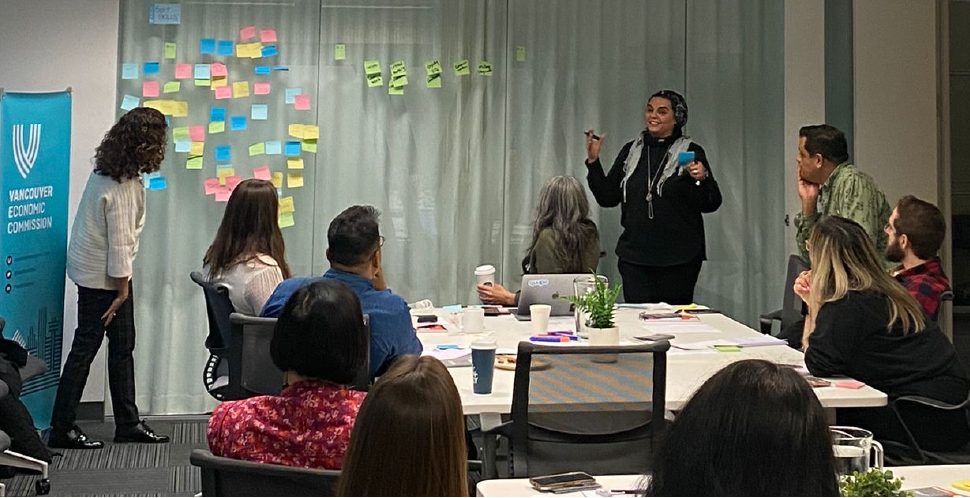According to the BC Government Labour Market Outlook 2021, the professional, scientific, and technical services industry is predicted to have the highest number of job openings in the next 10 years. With estimates of 262,000 to 362,000 job openings, but only 102,000 tech workers to fill them, the potential labour gap is a vast range of between 160,000 to 260,000 tech workers.
Newcomers are among those qualified potential employees, but face more barriers to entering this critical workforce due to a perceived lack of soft skills. This means that employers are missing out on many qualified potential employees. To help bridge this gap, the Vancouver Economic Commission (VEC) and Immigrant Employment Council of British Columbia (IEC-BC) have committed to developing bootcamps to provide newcomers with the necessary soft skills to be successful in the tech industry.
A key aspect of the design process is to build dignity, value and purpose into the curricula in a way that serves newcomers, including the celebration of cultural diversity and the lowering or outright removal of barriers to employment and education.
Khayla Almonte-Davila, VEC’s Manager of Economic Inclusion overseeing our inclusive workforce development portfolio, has penned the following update to share key findings from the recent newcomer focus groups and employer design labs, and to uphold transparency in the design process.
In this update
- What are the Tech Bootcamps and why are they important?
- Focus group outcomes: Top 3 soft skills perceived to be most important for newcomers
- Focus group outcomes: Top 5 most common employment challenges
- Design Lab 1 outcomes: identifying and understanding the problem
- Design Lab 2 outcomes: solving the problem (and next steps)
What are the Tech Bootcamps?
The Tech Bootcamps are employer-informed and cohort-based bootcamps meant to deliver soft skills-focused training to tech-skilled newcomers. VEC, alongside IEC-BC, is designing the Tech Bootcamps as a learning experience for both newcomers and tech employers, with an emphasis on acknowledgement and appreciation of cultural diversity. The design process is intentionally iterative, and allows for various points of feedback and communication between the newcomer and tech employer groups.
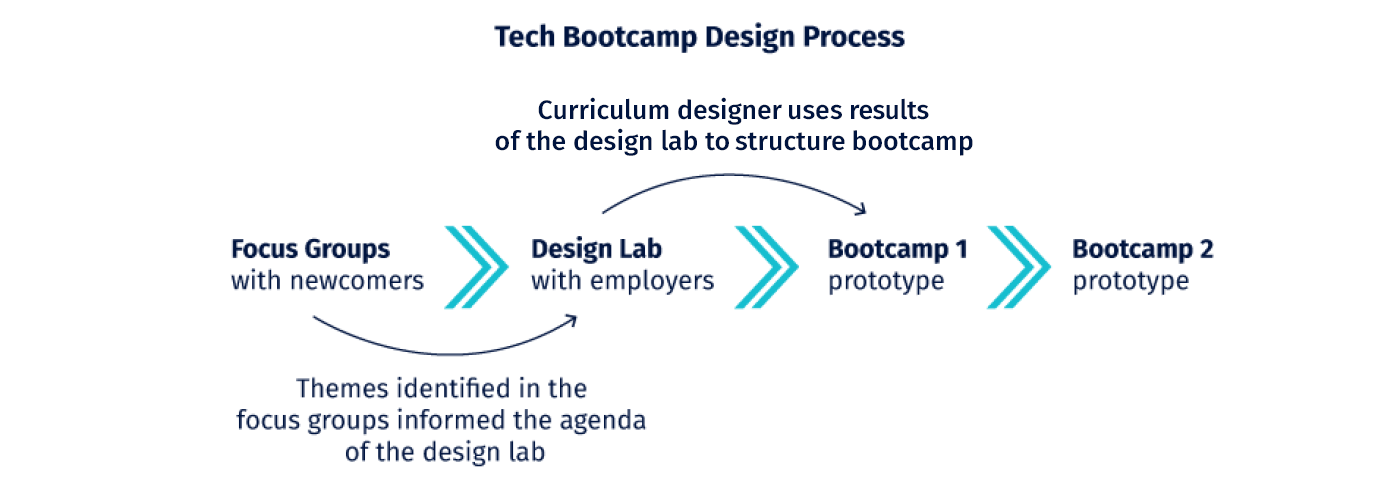
To facilitate two-way sharing, insights from the focus groups were used to shape the design lab process to ensure the concerns of newcomers were raised and discussed with employers. The results of the design labs will then inform the curriculum design for the bootcamps.
Focus group insights
The first stage of the design process was the newcomer focus groups. We first conducted five focus groups with a total of 22 newcomers to better understand what they perceive as the most important soft skills, the challenges with recruitment into the tech industry in Canada, and their understanding of Canadian experience and cultural fit.
Top 3 soft skills that newcomers perceive to be most important
- Verbal and written communication
- Problem solving
- Collaboration and teamwork
Top 5 employment challenges for newcomers
- English language proficiency: English proficiency is especially difficult in interview settings as candidates sometimes have challenges understanding the question and finding the right vocabulary. In addition, newcomers are often working harder during the interview process because they are translating the question and their answers into English.
- Lack of social capital and networking: The significance of networking is a newer concept to many newcomers. Participants expressed that, in their prior experience, educational merits were typically the most important credential while networking was not a major step in the employment process.
- Ineffective resumes and cover letters: Many participants shared that the concept of cover letters is new to them and that they struggle to tailor the letters for specific jobs. They also shared that they are unclear on how to match their resumes with job descriptions to increase their chance of being invited to an interview.
- Unclear expectations about the interview process: Demonstrating past achievements on resumes and during interviews was a significant challenge. Newcomers are uncertain of what skills they should emphasize, what certain questions mean, or how long they should take to answer. Moreover, they were uncertain what experience to talk about or how to highlight their past successes, including those outside work, so as to best demonstrate their capabilities or abilities outside technical skills.
- Lack of confidence: Confidence was a theme throughout the focus groups, often stemming from a lack of confidence to speak English and unfamiliarity with cultural and professional norms.
The vicious cycle: Canadian experience, soft skills, and recruitment
Newcomers in the focus group specifically discussed the hardships of obtaining Canadian experience, highlighting the way it directly relates to the ability of newcomers to fit in culturally and develop soft skills compatible with the expectations of Canadian employers.
Participants were aware of the importance of the Canadian experience and understand it to be the best way to learn unwritten cultural contexts, including how to communicate with coworkers and pick up appropriate workplace behavior. “Give me a chance to talk with you and show you my abilities even if it’s in the form of an internship,” said one of the focus group participants (2022).
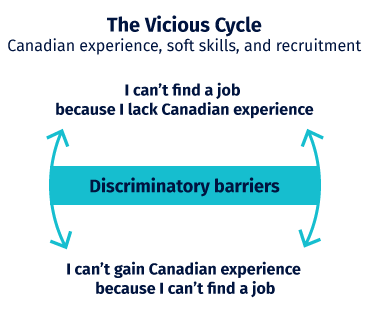
What are design labs?
Our design labs used equity-centred design principles to lead employers through facilitated sessions with the goal of building an employer-informed foundation for the Tech Bootcamps.
We hosted 28 employers in the tech space, encouraging challenging conversations about soft skills in the workplace.
Design Lab 1 – Understanding the Problem
The first design lab focused on better understanding the problem at hand. Our facilitator, Rania Younes, led a session to uncover the importance of soft skills in the workplace, the top soft skills employers are looking for, and the roles and processes involved in recruitment. We chose these conversation topics to directly address the insights of the newcomer focus groups.
Top soft skills identified by employers:
- Communication
- Collaboration and teamwork
- Critical thinking and problem solving
- Personal resiliency
- Coachability
Top employment challenges for employers:
Limited time and capacity: The fast-paced nature of the tech industry puts pressure on employers to choose a candidate quickly, even if they may not be suitable for the role. The time pressure also allows for bias, such as familiarity and affinity bias.
Miscommunication between hiring managers and recruiters: Hiring managers have a list of what they are looking for in a candidate, but it is hard for recruiters to find a candidate to fully match the job description. Miscommunication may also lead to recruiters and hiring managers inconsistently prioritizing qualifications and skills.
Recruitment as an entry-level position: Oftentimes, recruiting jobs are entry-level for new graduates. If a recruiter is new to the workforce as well as the position, it can be difficult for inexperienced recruiters to fully understand what the hiring manager needs, best identify transferrable skills, and understand and account for the nuances to watch for when interviewing and hiring newcomers.
Subjective assessment of soft skills: Soft skills are most often assessed through behavioural questions. However, newcomers may feel underprepared to effectively tell these stories in English. To exacerbate the issue, employers have varying definitions of each soft skill, with very few standardizing their understanding of what each recruiter or employer is looking for during the interview process.
Design Lab Outcomes

Newcomer Challenge
Unclear expectations about the interview process
Employer Challenge
Miscommunication between hiring managers and recruiters; Subjective assessment of soft skills
Example Scenario
The miscommunication between hiring managers and recruiters, as well as the subjective nature of soft skills assessment, can lead to a misalignment of priorities during interviews. Newcomers are less familiar with common interview questions and find it hard to pick up on what the interviewer is looking for. This, coupled with their relative lack of confidence with spoken English, can make it hard for newcomers to fully sell themselves.

Newcomer Challenge
Ineffective resumes and cover letters
Employer Challenge
Miscommunication between hiring managers and recruiters; Recruitment as an entry level position
Example Scenario
Newcomers have difficulties tailoring their resumes; therefore, reviewing their resumes may require reading between the lines.
This can prove difficult if there is miscommunication between the hiring managers and recruiters, and if the recruiters are not as experienced in picking out transferrable skills in job applications.

Newcomer Challenge
English language proficiency; Lack of social capital and networking; Lack of confidence
Employer Challenge
Lack of time and capacity
Example Scenario
The limited time and capacity of employers leads to bias.
The lack of social capital and networking means that newcomers start the interview process at a disadvantage, not having built a relationship with anyone at the company.
The lack of confidence and English proficiency newcomers face makes it hard to stand out during the interview. Recruiters may decide to move forward with candidates they are more familiar with and who are more similar to other candidates that were hired, not fully acknowledging and/or recognizing the advantages of hiring diversely.
Design Lab 2 – Building a Solution
The second design lab was comprised of employer representatives and took key findings from the first session and used them to start building the bootcamps. This process helps ensure that the actual needs of the sector will inform the activities and topics being covered by the bootcamps.
The reciprocal learning nature of the project design proved effective. Conversations about the recruitment process allowed for employers to critically think about how to adapt potentially discriminatory internal processes, how to create inclusive policies that support diverse hiring, how to build a non-competitive community of learning, and how to better support newcomers in developing their soft skills.
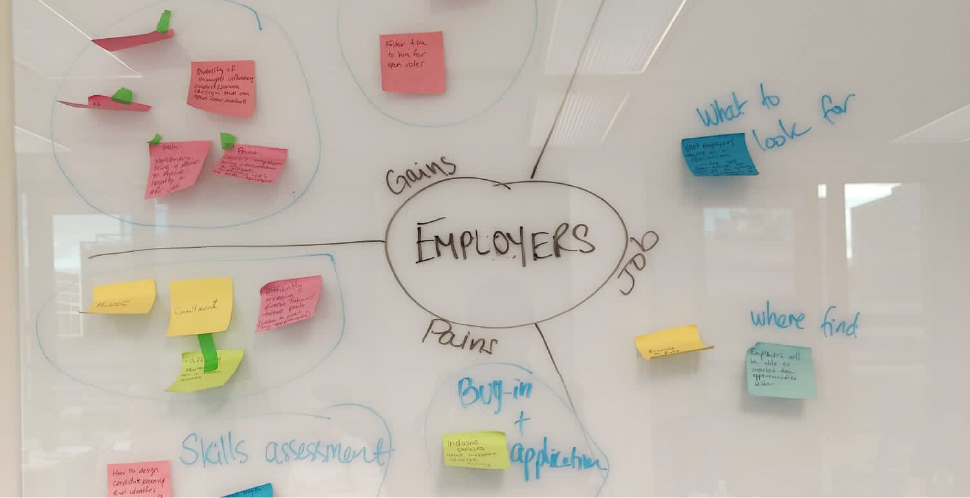
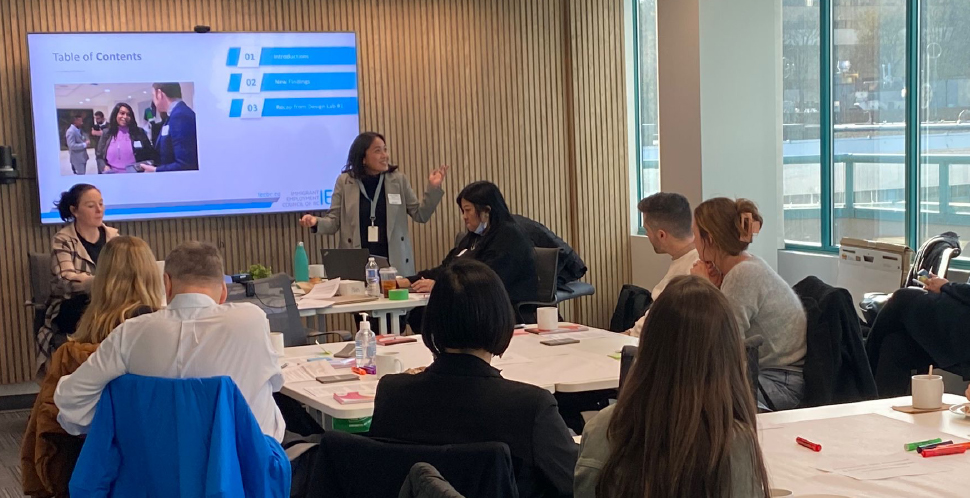
Design lab participants brainstormed new solutions, such as improv sessions to practice soft skills in real-life scenarios, and goal-setting sessions with direct managers who can provide mentorship or feedback related to acquiring or improving those soft skills.
These employers also shared resources and tools to better support one another in reducing discriminatory bias. All were committed to maintaining their involvement in the project beyond the design labs and tech bootcamps.
Outcomes of Design Lab 2 – What’s next?
IEC-BC has hired a curriculum designer to incorporate the findings from the focus groups and design labs to develop a bootcamp prototype. We invited employers who showed particular interest in staying engaged with the project to join a working group advancing the projects.
We plan to host the first bootcamp in March, after which the project team and working group will make iterative improvements to the curricula and execution, and host the second bootcamp in April 2023.
How you can get involved
If you are an employer interested in reducing barriers and creating a safe and inclusive environment for newcomers during the recruitment process or beyond, we invite you to reach out to us to explore how we can work together.
